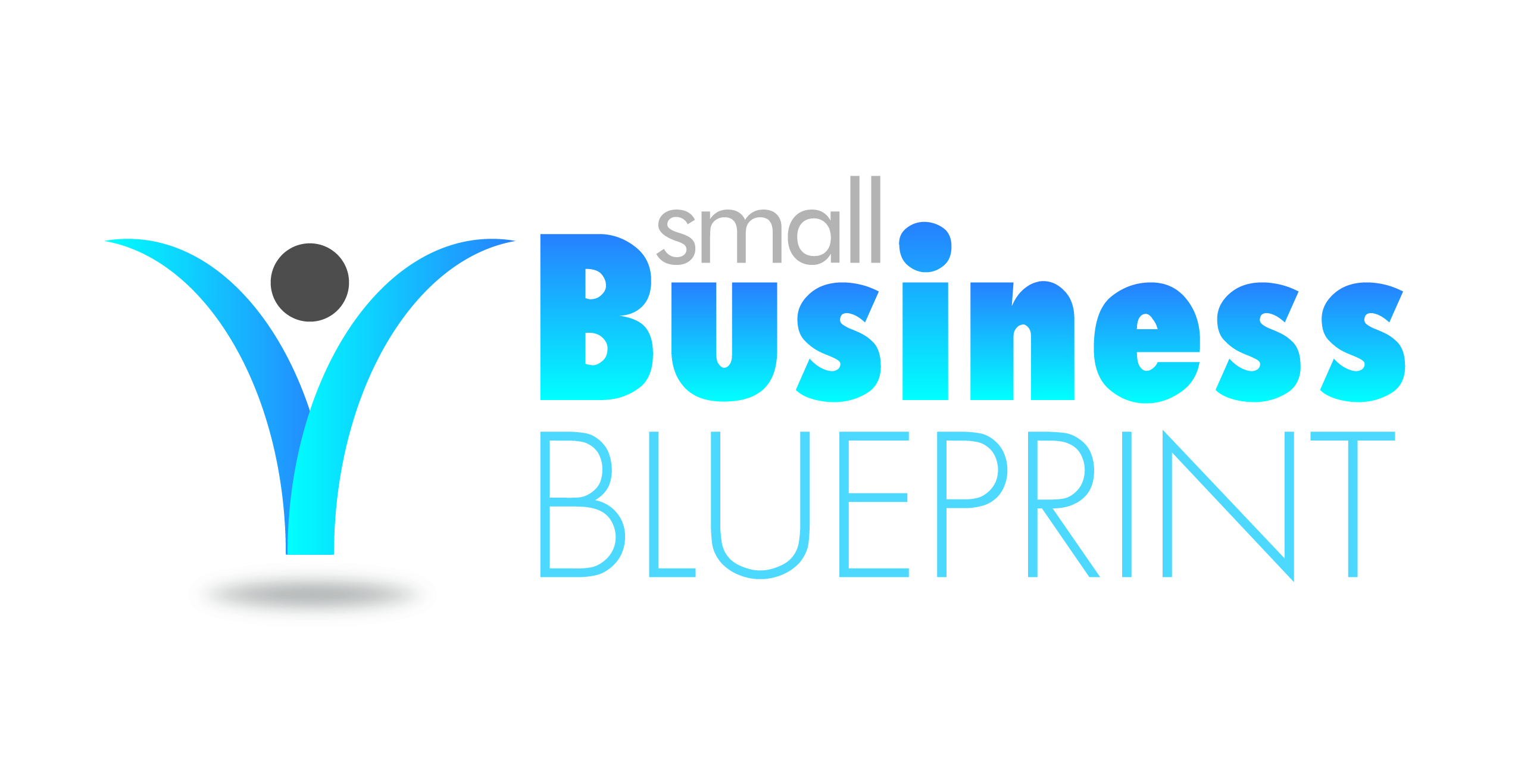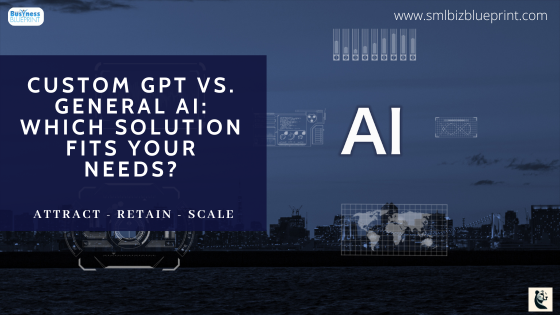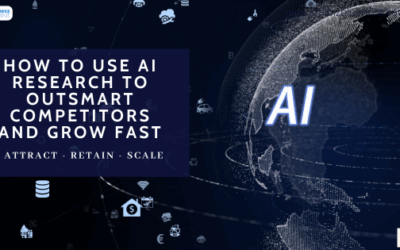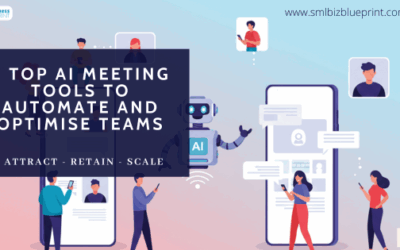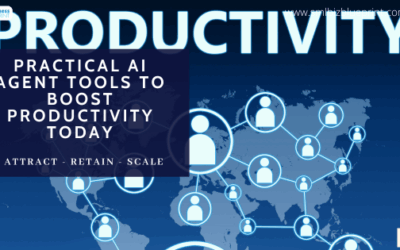Choosing the right AI solution for your business can feel like navigating a maze of jargon and endless possibilities.
With the rapid adoption of AI across industries, understanding the difference between Custom GPT and General-Purpose AI has never been more critical.
The wrong choice could leave you struggling with inefficiencies, while the right one could unlock unprecedented productivity and customer satisfaction.
In fact, according to Gartner, by 2025, over 80% of enterprises will have adopted AI tailored to specific business processes, leaving generic solutions behind in the race for competitive advantage.
This blog post breaks down the five key differences between Custom GPT and General-Purpose AI to help you make an informed decision.
Whether you’re looking to streamline operations, enhance customer engagement, or achieve greater accuracy in niche applications, we’ll show you how the right AI solution can transform your business.
Let’s dive into what sets these two AI approaches apart and uncover which is best suited for your unique needs.
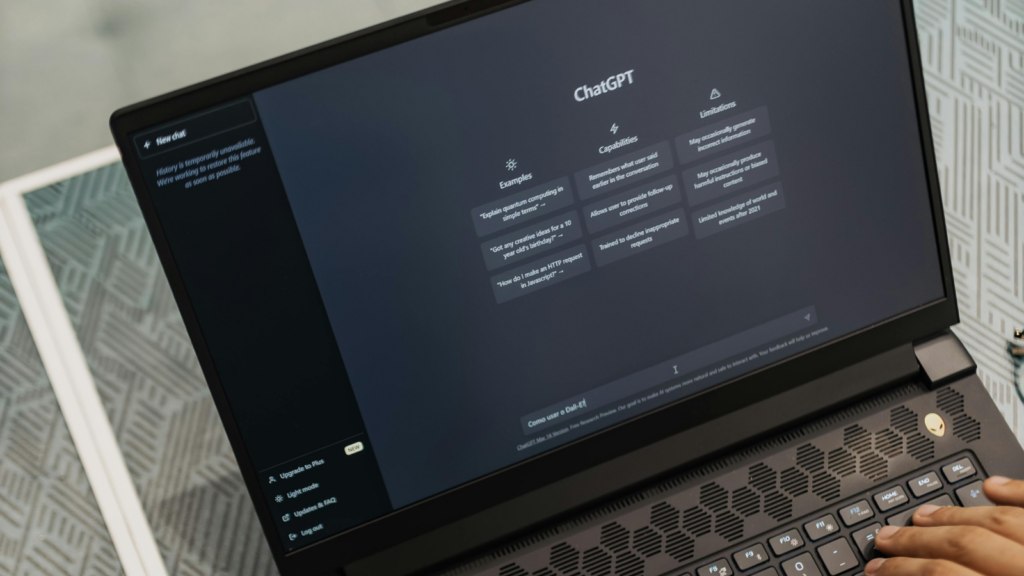
#1 What is Custom GPT?
Artificial intelligence has revolutionised how businesses operate, and Custom GPT (Generative Pre-trained Transformer) takes this to a whole new level.
Unlike General-Purpose AI, which is designed to perform a wide range of tasks without specific optimisation, Custom GPT is tailored to meet the unique needs of a particular business or industry.
This customisation ensures the AI delivers more accurate, efficient, and contextually relevant results.
What Makes Custom GPT Different?
At its core, Custom GPT is a specialised version of a general GPT model, trained on domain-specific data to address precise requirements.
Here’s what sets it apart:
Domain Expertise: Custom GPT is trained on data directly related to your business or industry, ensuring it speaks the language of your field. For example, a Custom GPT model for healthcare might include terminology and datasets from medical research.
Enhanced Accuracy: By focusing on specific tasks, Custom GPT avoids the ambiguity often found in General AI, delivering higher accuracy in results.
Greater Control: Businesses can dictate what the model learns, ensuring alignment with their goals and compliance with industry regulations.
Key Benefits of Custom GPT
Personalisation: Creates responses and insights tailored to specific customer needs.
Efficiency: Reduces time spent on repetitive tasks by automating them with precision.
Scalability: Adapts to evolving business requirements as the model is retrained with new data.
Example Use Case
A retail company uses Custom GPT to automate product recommendations. By training the model on customer purchase history and preferences, it generates hyper-personalized suggestions, increasing sales by 25% in six months.
Tips
- Define Your Goals: Identify the key challenges or inefficiencies you want to address. Clarity is crucial, whether it’s customer service automation or supply chain optimisation.
- Gather Quality Data: The success of a Custom GPT model hinges on the quality of data used for training. Use clean, relevant, and comprehensive datasets from your business operations.
- Start Small: Pilot the model in a specific business area before scaling up. For example, test a Custom GPT chatbot with one customer segment before a company-wide rollout.
By understanding what Custom GPT is and how it differs from General AI, you’re better equipped to leverage its potential to drive results for your business.
#2 General-Purpose AI: Strengths and Limitations
General-purpose AI models, such as OpenAI’s ChatGPT, are built to handle a wide array of tasks with minimal customisation. Their versatility makes them a popular choice for businesses looking to implement AI solutions without extensive training or setup quickly.
However, while General AI excels in certain areas, its limitations can hinder its effectiveness for niche or specialised applications.
Strengths of General-Purpose AI
Versatility: General AI can handle multiple tasks, from drafting emails to answering customer inquiries, making it ideal for businesses with diverse needs.
Ease of Deployment: With no extensive training required, General AI can be implemented quickly, reducing time to market.
Cost-Effectiveness: General AI offers a low-cost entry point to explore AI-driven solutions for businesses with limited budgets.
Limitations of General-Purpose AI
Lack of Depth: General AI lacks domain-specific knowledge, which can lead to generic or inaccurate responses for specialised tasks.
Lower Accuracy: General AI may struggle with precision in highly specialised scenarios without training on targeted datasets.
Limited Personalization: Since it’s designed to be a one-size-fits-all solution, General AI doesn’t cater to unique business requirements or customer needs.
Example Use Case
A small e-commerce business uses a General AI chatbot to answer basic customer questions about order status and shipping. While this solution works for common queries, it struggles with detailed product-specific questions, leading to customer dissatisfaction.
Tips
- Use for Broad Applications: Focus on tasks like FAQ automation, content generation, or customer support for common inquiries where General AI thrives.
- Integrate with Other Tools: Combine General AI with existing tools (e.g., CRM systems) to extend its functionality and improve effectiveness.
- Monitor Performance Regularly: Keep track of metrics like response accuracy and customer satisfaction to identify areas where General AI may need supplementary support or adjustments.
By understanding the strengths and limitations of General AI, businesses can better align their capabilities with their operational goals and identify when to consider more specialised solutions like Custom GPT.
#3 Custom GPT vs. General-Purpose AI: Which is Right for Your Business?
Choosing between Custom GPT and General-Purpose AI can significantly impact your business’s efficiency, scalability, and customer satisfaction.
While both have their strengths, the best choice depends on your specific needs, goals, and resources.
This section compares the two AI solutions to help you decide which is the right fit for your business.
Key Factors to Consider
Purpose and Use Case
General AI: Best for broad applications, such as automating basic customer service, content generation, or general inquiries.
Custom GPT: Ideal for specialised tasks like analysing industry-specific data, creating personalised customer experiences, or improving accuracy in complex operations.
Cost and Resources
General AI: Lower upfront cost, making it a good choice for small businesses or those exploring AI for the first time.
Custom GPT: Requires a higher investment to develop and train but offers long-term ROI through improved efficiency and precision.
Example: A startup may start with General AI for affordability, while a manufacturing company invests in Custom GPT to streamline production processes.
Scalability and Flexibility
General AI: Limited adaptability as your business grows or changes.
Custom GPT: Scales with your business, allowing you to retrain and refine the model as new needs emerge.
Example: A growing e-commerce platform retrains its Custom GPT to include new product categories and customer segments.
Accuracy and Personalization
General AI: Provides generic responses that may lack depth for specialised tasks.
Custom GPT: Delivers precise, context-specific outputs tailored to your industry.
Example: A healthcare provider uses Custom GPT to generate accurate medical reports, while General AI struggles to interpret clinical data.
Decision-Making Framework
General AI is Right If:
Your tasks are broad and do not require deep domain knowledge.
You have budget constraints or are new to AI implementation.
You need a quick, off-the-shelf solution for everyday operational needs.
Custom GPT is Right If:
Your business deals with complex, industry-specific tasks.
You need high accuracy and personalisation to meet customer or operational demands.
You’re seeking long-term scalability and a competitive edge.
Tips
- Assess Your Business Needs: Outline the specific challenges you want to solve with AI. Custom GPT is likely the better choice if the tasks are niche or highly specialised.
- Start Small and Scale Gradually: If you’re unsure, begin with General AI for simple tasks and transition to Custom GPT as you identify more targeted needs.
- Consult an Expert: Partner with an AI consultant or provider to evaluate your goals, budget, and operational demands before making a decision.
By carefully evaluating your business requirements and the capabilities of each solution, you can make an informed choice that maximises ROI and sets the stage for sustainable growth.
Be the first to know!
Join our newsletter for cutting-edge strategies and tools tailored for ambitious business owners like you.
#4 Cost Comparison: Custom GPT vs. General AI
Cost often becomes a critical factor when deciding between Custom GPT and General-Purpose AI.
While both solutions offer significant value, their cost structures and potential ROI differ substantially.
Understanding these differences will help you allocate resources effectively and ensure you choose the AI solution that aligns with your business goals and budget.
Cost Structure of General AI
Lower Upfront Costs: General AI solutions like ChatGPT require minimal initial investment. Many are subscription-based, with pay-as-you-go options.
Operational Costs: These include platform fees, API calls, or per-use charges, which can add up if usage scales.
Hidden Costs: General AI may require additional investments in integrations or manual oversight to handle tasks beyond its capabilities.
Example:
A startup might spend $50–$100 monthly for a General AI-powered chatbot to handle basic customer service tasks.
Cost Structure of Custom GPT
Higher Initial Investment: Developing and training a Custom GPT model involves significant costs, including data collection, cleaning, and training infrastructure.
Tailored ROI: The higher upfront cost pays off in long-term efficiency, scalability, and improved accuracy.
Maintenance Costs: Regular updates and retraining ensure the model remains relevant, adding to ongoing expenses.
Example:
A healthcare company investing $20,000 to build a Custom GPT for clinical diagnosis sees a 30% reduction in diagnostic errors, saving substantial operational costs annually.
ROI Comparison
General AI: Provides immediate value for general tasks but may not scale effectively with growing business demands.
Custom GPT: Offers higher long-term ROI by addressing specific challenges, reducing inefficiencies, and creating tailored customer experiences.
Cost-Benefit Scenarios
Scenario 1 – Small Business:
Use General AI for FAQ automation and simple operational tasks.
Focus on affordability and ease of use to streamline processes.
Scenario 2 – Established Business:
Invest in Custom GPT to address complex workflows or customer personalisation.
Prioritise long-term scalability and competitive advantage.
Tips
- Start with a Cost Analysis: Compare both solutions’ upfront, operational, and maintenance costs. Factor in potential productivity gains and savings over time.
- Evaluate Task Complexity: Use General AI for simple, repetitive tasks and consider Custom GPT for specialised, high-impact applications.
- Scale Strategically: Begin with a small deployment of either solution and expand as you see measurable benefits, avoiding unnecessary upfront expenses.
Understanding the cost dynamics of General AI versus Custom GPT ensures that your investment aligns with your business needs, delivering maximum value both now and in the future.
#5 Performance and Accuracy: Why Custom GPT Excels in Niche Applications
When precision and tailored solutions are critical, Custom GPT outperforms General-Purpose AI by delivering accuracy and context-specific insights.
While General AI is versatile, its one-size-fits-all nature limits its ability to effectively address highly specialised or complex tasks. This section dives into why Custom GPT is the better choice for businesses seeking optimised performance in niche applications.
How Custom GPT Delivers Superior Performance
Specialised Training
Custom GPT models are trained on industry-specific or task-specific data, ensuring they understand the nuances of a particular domain. This allows them to produce contextually accurate responses and insights.
Example: A real estate business uses Custom GPT to analyse local housing market trends, providing tailored reports for clients.
Higher Accuracy
General AI relies on pre-trained data, which may not fully capture the intricacies of niche industries. Custom GPT achieves higher accuracy by focusing on relevant data, reducing errors and improving reliability.
Enhanced Relevance
Custom GPT aligns with specific business goals, providing outputs that are accurate and aligned with the company’s brand voice and messaging.
Why General AI Falls Short in Niche Applications
Generic Outputs: General AI provides responses that may lack depth, failing to meet the demands of specialised tasks.
Knowledge Gaps: General AI can misinterpret critical information or generate irrelevant results without training on domain-specific data.
Inconsistent Performance: General AI may excel at basic tasks but falters when faced with complex scenarios requiring expert-level knowledge.
Tips
- Invest in High-Quality Data: Use clean, structured, and domain-specific data to train your Custom GPT model, ensuring accurate and relevant outputs.
- Regularly Update the Model: Keep your Custom GPT updated with the latest trends and data to maintain performance as industries evolve.
- Pilot the Solution: Test the model in a controlled environment before full deployment, allowing you to identify and fix any inconsistencies early.
By leveraging the enhanced accuracy and performance of Custom GPT, businesses can tackle specialised challenges with confidence, improving both efficiency and customer satisfaction.
#6 Security and Scalability: A Comparative Analysis
In an era where data is the backbone of decision-making, security and scalability are paramount when selecting an AI solution. Custom GPT and General AI differ significantly in handling these critical factors.
While General AI provides convenience and broad usability, Custom GPT offers enhanced security measures and scalability tailored to a business’s evolving needs.
Security: Why Custom GPT is the Safer Option
Data Ownership and Control
Custom GPT models are typically deployed in private environments, ensuring businesses maintain full ownership and control of their data. This minimises the risk of exposure to third-party platforms.
Compliance with Regulations
Custom GPT models can be designed to meet specific regulatory standards, such as GDPR, HIPAA, or industry-specific compliance frameworks. This is particularly important for healthcare, finance, and legal services sectors.
Minimised Risk of Data Breaches
General AI platforms often rely on cloud-based infrastructures, which can increase vulnerability to cyberattacks. Custom GPT models, by contrast, can be hosted in secure, isolated environments.
Scalability: How Each Solution Evolves with Your Business
Custom GPT: Built for Growth
Custom GPT can scale alongside your business by retraining the model with new data or integrating it into larger systems. This flexibility ensures it remains relevant as your needs evolve.
Example: A retail chain expands its Custom GPT from handling inventory management to optimising logistics across multiple locations.
General AI: Limited Adaptability
While General AI solutions can handle basic scalability, they often require significant reconfiguration or replacement when businesses outgrow their capabilities.
Cost-Efficient Scaling
Although Custom GPT has a higher upfront cost, its ability to scale efficiently over time makes it a cost-effective choice for long-term growth.
Custom GPT in Action
A healthcare organisation uses a Custom GPT model to process patient data securely. Over time, the model scales to include predictive analytics for resource allocation, improving operational efficiency by 40%.
Tips
- Choose a Secure Hosting Environment: Host your Custom GPT model on private servers or secure cloud platforms to protect sensitive data.
- Plan for Scalability Early: Design your Custom GPT with future growth in mind, ensuring it can integrate seamlessly with new systems or processes.
- Regularly Audit Security Protocols: Perform periodic reviews of your AI solution to ensure it complies with the latest security standards and industry regulations.
By prioritising security and scalability, businesses can leverage AI solutions that not only protect sensitive information but also adapt to future challenges and opportunities.

#7 Making the Transition: How to Implement Custom GPT for Your Business Needs
Transitioning to Custom GPT can unlock transformative potential for your business, but a successful implementation requires careful planning and execution.
This section outlines a step-by-step process for adopting Custom GPT and highlights strategies to ensure a smooth integration with your existing operations.
Step 1: Define Your Objectives
Start by identifying the specific challenges or inefficiencies you aim to address with Custom GPT.
Example Objectives:
Automating repetitive tasks, such as customer inquiries.
Enhancing personalisation in marketing efforts.
Improving accuracy in data analysis or reporting.
Tip: Align your objectives with measurable outcomes, such as reduced response times or increased customer satisfaction.
Step 2: Collect and Prepare Your Data
The effectiveness of Custom GPT relies heavily on the quality of the data used for training.
Steps to Prepare Data:
Gather domain-specific datasets from your business operations.
Clean the data to remove inaccuracies or inconsistencies.
Organise the data into structured formats for efficient training.
Example:
A retail business collects customer purchase histories and product catalogues to train its Custom GPT for personalised recommendations.
Step 3: Choose the Right Partner or Platform
Unless your business has in-house AI expertise, partnering with an experienced AI provider can simplify the development process.
Key Factors to Consider:
Expertise in your industry.
Proven experience with Custom GPT implementations.
Scalability and support for ongoing updates.
Step 4: Train and Fine-Tune Your Model
Once your data is ready, the next step is training your Custom GPT model.
Training Process:
Use your dataset to teach the model industry-specific language and context.
Fine-tune the model by iterating on its outputs until it aligns with your goals.
Conduct pilot tests with a small team or customer segment.
Example:
A healthcare provider tests its Custom GPT model with a subset of patient queries before full-scale deployment.
Step 5: Integrate and Monitor Performance
Deploy the Custom GPT solution and ensure seamless integration with your existing systems, such as CRMs or marketing tools.
Monitoring Tips:
Set up KPIs to measure performance (e.g., response accuracy tand ask completion rates).
Use feedback loops to continually improve the model’s outputs.
Tips
- Start with a Pilot Project: Begin by applying Custom GPT to a single task or department before rolling it out across your organisation.
- Provide Staff Training: Ensure your team understands how to use the model effectively and can provide feedback for further improvements.
- Plan for Continuous Updates: Regularly retrain your model with new data and insights to keep it relevant and effective.
By following these steps and practical tips, businesses can seamlessly integrate Custom GPT into their operations, achieving higher efficiency and precision while positioning themselves for sustained growth.
#8 The Future of AI: Customization vs. Generalization in AI Models
As AI evolves, the debate between customisation and generalisation becomes increasingly relevant for businesses seeking to remain competitive.
Custom GPT and General AI represent two distinct approaches to AI solutions, and understanding their future roles can help businesses make strategic decisions today.
Customisation: The Trend Toward Specialized AI
Rising Demand for Industry-Specific Solutions
Businesses are increasingly adopting AI tailored to their unique needs. Custom GPT models provide the precision and depth required for specialised tasks, ensuring they remain relevant in competitive markets.
Integration with Emerging Technologies
Custom GPT is often paired with other advanced technologies like IoT and blockchain to address complex, multi-layered challenges.
Future-Proofing Through Adaptability
The ability to retrain and update Custom GPT models ensures they keep pace with industry trends and evolving customer expectations.
Generalisation: Versatility in a Broader Context
Advancements in General AI Models
Recent innovations in General AI have improved its versatility and contextual understanding. These models are becoming more user-friendly and accessible for small businesses.
Example: Tools like ChatGPT can handle tasks ranging from drafting emails to brainstorming marketing ideas with minimal setup.
The Role of General AI in Rapid Prototyping
General AI is a valuable tool for experimentation and testing ideas before committing to more specialised solutions.
Example: A startup uses General AI to explore customer service automation, later transitioning to a Custom GPT for better personalisation.
Simplicity and Cost-Efficiency
While less accurate for niche tasks, General AI’s affordability and ease of implementation ensure its continued relevance for many businesses.
Emerging Trends in AI Development
AI-as-a-Service (AIaaS)
The rise of AIaaS platforms is making Custom GPT more accessible to smaller businesses by reducing development costs.
Hybrid Models
Businesses are combining General AI with Custom GPT to maximise both versatility and specialisation, creating hybrid solutions tailored to specific workflows.
Example: A retail chain uses General AI for customer inquiries and Custom GPT for advanced inventory analytics.
Ethical AI Development
Custom and General AI must address growing concerns around transparency, bias, and data security to maintain trust and compliance.
Tips
- Evaluate Your Long-Term Needs: Determine whether your business would benefit more from ongoing customisation or if general solutions meet your operational goals.
- Experiment with Hybrid Approaches: Combine General AI and Custom GPT to balance cost, scalability, and specialisation.
- Stay Informed About Trends: Regularly monitor advancements in AI technology and assess how they align with your business objectives.
By understanding the trajectory of customisation and generalisation in AI, businesses can confidently navigate the evolving landscape and make decisions that position them for long-term success.
Stay in the know!
Pulse is your go-to resource for the latest trends and proven tactics to grow your business. Subscribe today!
Get Pulse Here
Conclusion
As businesses navigate the dynamic world of AI, the choice between Custom GPT and General AI hinges on their unique needs, goals, and resources.
Each solution brings distinct advantages: General AI offers versatility and affordability for broad applications, while Custom GPT delivers precision, scalability, and tailored solutions for specialised tasks.
Throughout this blog post, we’ve explored the key differences between these two AI approaches:
- Custom GPT excels in niche applications, providing industry-specific accuracy, enhanced security, and long-term scalability.
- General AI shines in versatility and ease of deployment, making it an accessible starting point for businesses exploring AI.
- Cost, performance, security, and future adaptability are critical factors to weigh when making your decision.
The future of AI lies in balancing customisation and generalisation, ensuring that businesses can adapt to emerging trends while meeting their specific objectives.
Your Next Steps
If you’re ready to explore how AI can transform your business, it’s time to take action:
- Assess your needs: Identify the challenges AI could address in your operations.
- Evaluate your options: Determine whether Custom GPT, General AI, or a hybrid approach suits you.
- Partner with experts: Work with experienced AI providers to ensure seamless implementation and measurable ROI.
Let’s shape the future of your business together. Contact us today to discuss your AI needs and discover how Custom GPT or General AI can help you achieve your goals.
With the right AI solution, your business can achieve new levels of efficiency, innovation, and growth.
Start your journey now!
FAQs
Q1: What is the main difference between Custom GPT and General AI?
A1: Custom GPT is tailored to meet specific business needs by being trained on domain-specific data. At the same time, General AI is designed to handle a wide range of general tasks without specific optimisation.
Q2: Which businesses should choose Custom GPT over General AI?
A2: Custom GPT is ideal for businesses that need precise, industry-specific solutions, such as healthcare, legal services, or finance, where accuracy and specialisation are critical.
Q3: Is Custom GPT more expensive than General AI?
A3: Yes, Custom GPT generally requires a higher initial investment for training and deployment, but it often delivers a greater return on investment (ROI) through improved efficiency and long-term scalability.
Q4: How does Custom GPT ensure data security?
A4: Custom GPT can be hosted in private, secure environments, giving businesses complete control over their data and ensuring compliance with industry regulations like GDPR and HIPAA.
Q5: Can businesses start with General AI and transition to Custom GPT later?
A5: Yes, many businesses begin with General AI to explore AI’s potential and transition to Custom GPT as their needs become more specific and complex.
Q6: What are the advantages of Custom GPT for scalability?
A6: Custom GPT can evolve alongside your business by retraining the model with new data, integrating it into larger systems, and adapting to changing workflows.
Q7: How can businesses measure the ROI of Custom GPT?
A7: ROI can be measured through metrics like increased productivity, reduced errors, enhanced customer satisfaction, and cost savings from automation and efficiency improvements.
Q8: What are the limitations of General AI?
A8: General AI lacks domain-specific knowledge, may provide generic responses, and struggles with accuracy in complex or niche tasks, making it less suitable for highly specialised industries.
Other Articles
7 Reasons Why Small Businesses Stop Growing—and How to Overcome Them
10 AI Email Tools for Small Business Email Marketing
Email Marketing for 2025: 5 Trends Small Businesses Must Know
